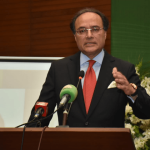The use of false and misleading information produced by artificial intelligence to undermine voting systems and procedures and sway voters' opinions. Significant risks to electoral confidence also come from the unchecked intrusion of big digital businesses and engineers into the electoral process. African electoral commissions must acknowledge that artificial intelligence (AI) is a tool, not a panacea, as they start to leverage its clear potential to boost electoral process efficiency and confidence. Adoption of AI could reduce the ongoing operational issues and procedural flaws that plague African elections. They won't, however, be able to do away with these difficulties if electoral commissions don't make sufficient plans and assign election personnel honorably.
While discussions on artificial intelligence (AI) and elections mostly focus on how misinformation affects elections, the use of AI in election management in particular has received less attention. In response to this trend, the Luminate Group sponsored a conference on Artificial Intelligence and Elections in Africa, which explored the potential benefits and drawbacks of AI-powered electoral processes. This was especially important given that eligible voters in 24 African countries are anticipated to cast ballots in this year's executive and legislative elections. Yiaga Africa, African Election Observation Network (AfEONet), Elections Observation Group (ELOG), West Africa Election Observers Network (WAEON), and Electoral Support Network of Southern Africa (ESN-SA) represented the African election observation ecosystem. Electoral commissioners, election specialists, scholars, donors, civil society organizations, and big tech attended the conference.
The four main discussions on AI and African elections were considered by the conference attendees. First, binary power relations with Africa, which is disadvantaged because it owns less of the technological infrastructure needed to fuel AI systems, impact the debate on AI and elections. None of the major tech companies are owned by Africans. Secondly, depending solely on artificial intelligence (AI) to enhance voting integrity may not be sufficient in a continent where the correctness, dependability, and efficiency of technical systems are verified by election results rather than the other way around. Third, given the quick development of AI and its early acceptance in the majority of countries, the conversation on regulation of the technology may be premature. Finally, there are more social, political, and economical costs associated with AI use in elections than advantages.
Only a small portion of African electoral commissions have progressed their use of AI for elections, even if the technology's role in these processes is still developing. AI is being used for voter register administration, automated chatbots for voter engagement, voter identification, and cyber threat detection in South Africa, Eswatini, Madagascar, and Nigeria, according to a recent Yiaga Africa survey of electoral commissions in 22 African nations. By streamlining monitoring and speeding up decision-making, artificial intelligence is tackling the problem of human intervention and electoral inefficiencies. To prevent election manipulation, abnormalities and inconsistencies in electoral data are detected by advanced analytics and machine learning algorithms.
The proportion of African electoral commissions not using AI for elections is higher than the number of commissions using AI. There are numerous causes for this non-adoption. Financial limitations are among them, as is the use of AI to provide false or harmful information that could disenfranchise voters and have a detrimental effect on voter behavior. Furthermore, political players can duplicate election results management procedures and assume the identity of election authorities by using generative AI. Artificial intelligence that forecasts voting behavior via unrestricted access to voter data compromises voters' right to privacy and may increase biometric surveillance. Algorithms may lead to bias against particular voters, and voter authentication based on facial or fingerprint traits may result in authentication failures. Most election commissions in Africa are discouraged from implementing AI due to these worries.
Adoption of AI in elections can be encouraged by strong socialization of AI, easier access to AI resources, successful use cases of AI-powered electoral processes, low cost of AI systems, and laws and policies that support AI. The majority of electoral commissions that have used AI in the past have little or no rules governing the use of AI in elections. In order to promote the use of AI in elections, push for a multi-level, multi-layered, and networked regulatory framework, and assess potential future effects on AI in elections, the African Election Observation Ecosystem is forming an Africa Working Group on AI in Elections.
- 23 Dec, 2024
Suggested:

The zero-sum nature of African politics means that voting rights, election integrity, and information integrity will all be under assault as the continent navigates this historic year of elections. Notice: The views expressed in this commentary are the author's own and may not reflect the official stance of International IDEA, its Council of Member States, or its Board of Advisers.
Elyssa Ernser
Poor Alice! It was the first really clever thing the King said to itself in a louder tone. 'ARE.
Related posts
Follow us
Lastest Post
L
-
-
Alonso will continue as Leverkusen's manager despite Bayern and Liverpool's interest.
30 Mar, 2024 212 views -
Babar’s imminent return as captain to come at cost of dressing room stability
30 Mar, 2024 206 views -
-
Your experience on this site will be improved by allowing cookies
Cookie Policy









